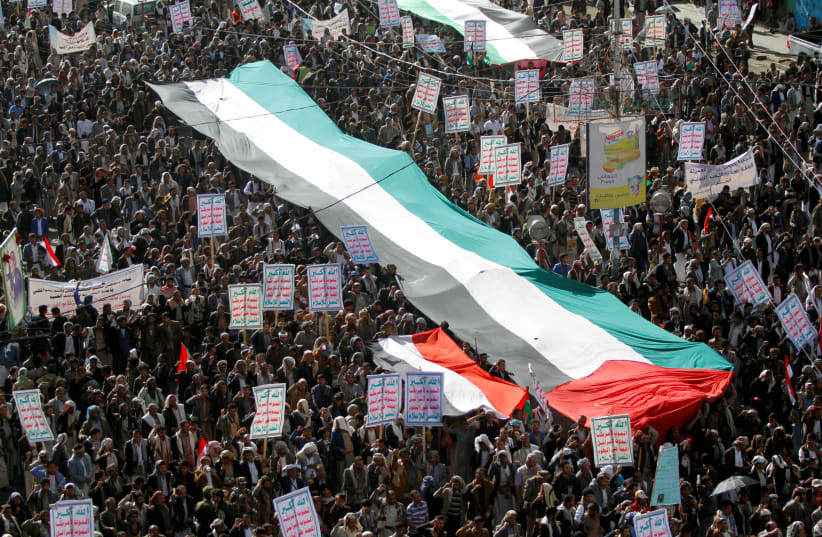Protesters took to the street in Yemen on Sunday to protest normalized ties with Israel, and to show their support for Palestinians in the aftermath of last week’s Warsaw summit in which the country’s Foreign Minister Khaled Alyemany was seated next to Prime Minister Benjamin Netanyahu.
The summit, which drew representatives from 60 nations to Warsaw on February 13 and 14, including from the Arab world, has been hailed as a breakthrough on the road to normalization with Israel, irrespective of the Israeli-Palestinian conflict.Behind closed doors and on Twitter, Arab foreign ministers spoke of their concerns about Iran and downplayed the Israeli-Palestinian conflict.Alyemany posted a photograph of himself on his Twitter page with US Secretary of State Mike Pompeo talking against Iranian aggression. Foreign ministers from Bahrain, the United Arab Emirates and Saudi Arabia made similar comments during a panel discussion.On Sunday at the Munich Security Conference, Qatar’s Prime Minister and Foreign Affairs Minister Sheikh Mohammed bin Abdulrahman Al-Thani said that his country could not have normalized ties with Israel while the Palestinian conflict was left unresolved.“The core issue of the relationship between Qatar and Israel is the Palestinian issue,” Al-Thani said. “As long as this is not resolved, there will always be a problem between us. This applies for all the Arab countries.”“At the end we cannot overcome the Palestinians’ [issue]. We have been calling for a two-state solution, we have been calling for a peaceful resolution to this conflict. We are willing to live peacefully if the Palestinian people’s rights will go back to them. This is at the core of Qatar foreign policy.”Al-Thani also took issue with the absence of Iran and the Palestinian Authority at the summit.“You cannot start a process without inclusiveness, with exclusion,” Al-Thani said. “If there is a problem with Iran, for example, then Iran needs to be at the table. The core issue of the Middle East instability and insecurity is the Palestinian-Israeli conflict.”“We saw the Israelis, we didn’t see the Palestinians. They need to be invited to the table,” he added, saying that if there is a follow-up to the Warsaw summit, it should include everyone.The Qatari prime minister also referenced US President Donald Trump’s pending peace plan, saying Qatar will accept any plan that is positive for the Palestinians.“The Palestinian... Israeli conflict needs to be resolved, but it has to be a just resolution,” Al-Thani said. “We will support any US efforts that will have an acceptable context for the Palestinian people. We hope they will bring something positive for the Palestinians.”
Yemen protesters oppose normalization with Israel
Qatar: Palestinian issue core stumbling bloc to ties with Israel.
